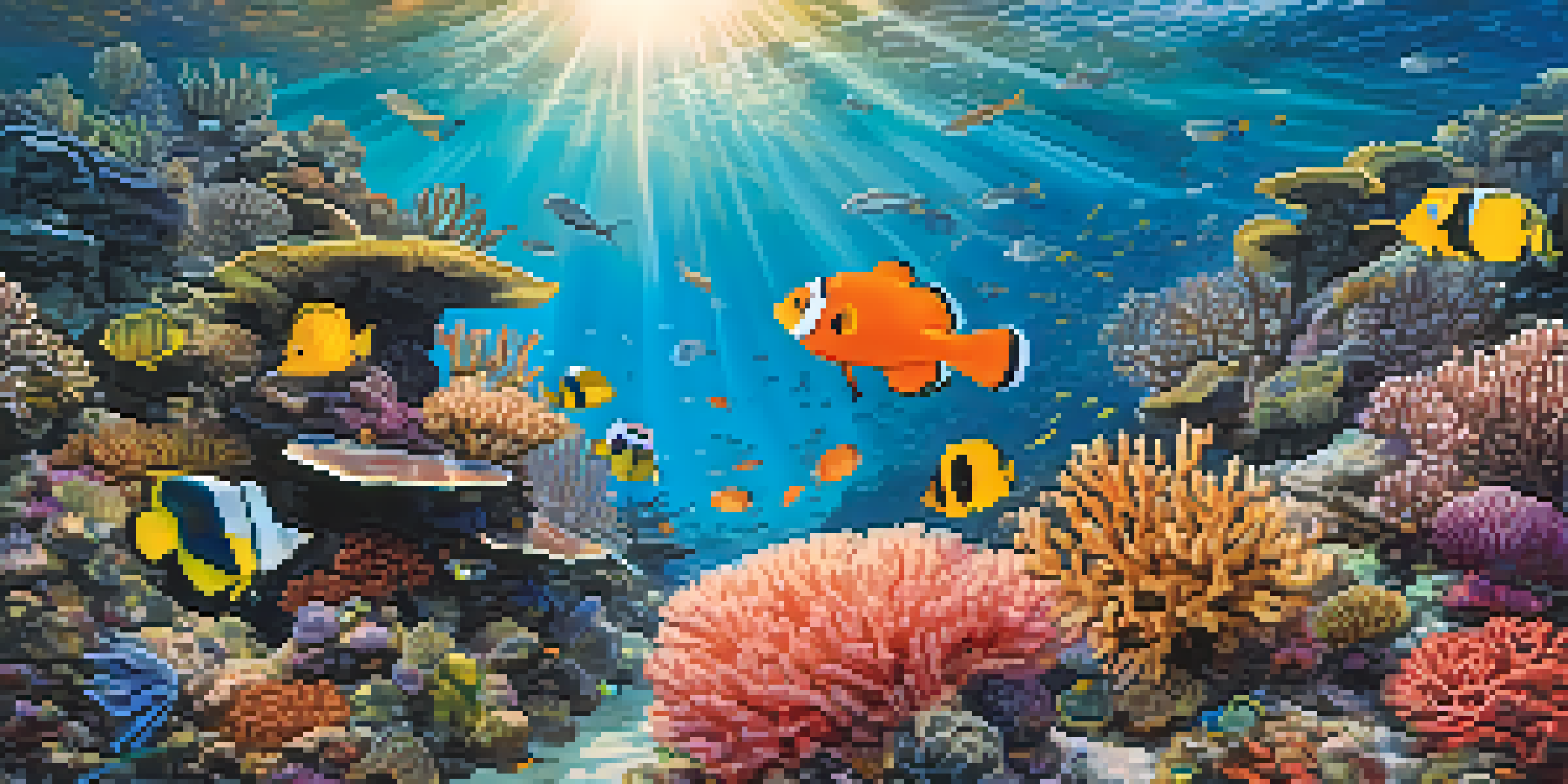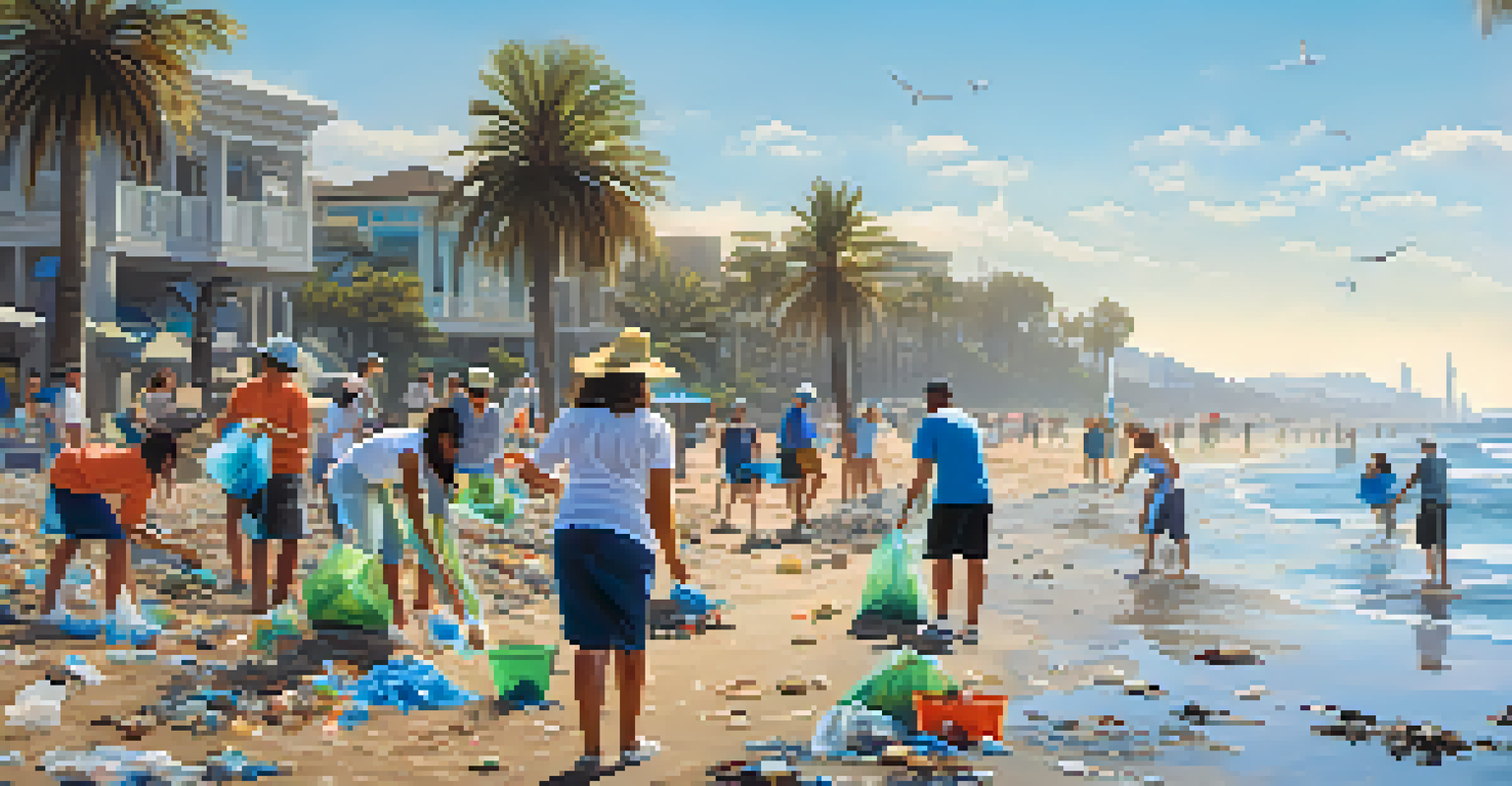San Diego's Coral Reefs: Beauty and Conservation Challenges

Introduction to San Diego's Coral Reefs and Their Importance
San Diego's coastline is home to vibrant coral reefs that play a crucial role in marine ecosystems. These underwater gardens provide habitat for a wide array of marine life, from colorful fish to delicate sea turtles. The reefs not only support biodiversity but also protect coastal areas from erosion and boost local economies through tourism and fishing.
Coral reefs are the most diverse marine ecosystems on Earth, providing habitat for countless species and contributing to the overall health of our oceans.
Understanding the importance of coral reefs is essential, especially as they are often referred to as the 'rainforests of the sea.' They contribute to the health of ocean environments and serve as indicators of oceanic changes. When coral reefs thrive, it signals a balanced ecosystem; when they suffer, it reflects broader environmental issues.
In this article, we will explore the beauty of San Diego's coral reefs, the challenges they face, and what is being done to protect these underwater treasures. By shedding light on these issues, we hope to inspire a deeper appreciation and commitment to their conservation.
The Stunning Diversity of San Diego's Coral Reefs
San Diego's coral reefs boast a remarkable diversity of species, making them a hotspot for marine biodiversity. From the intricate coral formations to the myriad of fish and invertebrates, these reefs are teeming with life. Snorkelers and divers often describe the experience as entering a vibrant underwater city filled with movement and color.

One of the most fascinating aspects of these reefs is the symbiotic relationships between species. For example, clownfish find refuge in anemones, while the anemones benefit from the nutrients provided by the clownfish. This interconnectedness demonstrates the delicate balance of marine ecosystems and highlights the importance of preserving these habitats.
Coral Reefs: Vital Marine Ecosystems
San Diego's coral reefs support biodiversity, protect coastlines, and boost local economies.
Moreover, coral reefs are not just visually stunning; they also serve as crucial breeding grounds for many fish species. The health of these reefs directly influences the local fishing industry, making their conservation vital for both environmental and economic sustainability.
Key Threats Facing Coral Reefs in San Diego
Despite their beauty, San Diego's coral reefs face significant threats that jeopardize their existence. Climate change is one of the leading factors, causing ocean temperatures to rise and resulting in coral bleaching. This phenomenon occurs when corals expel the algae living in their tissues, leading to a stark white appearance and, ultimately, their death if conditions do not improve.
The loss of coral reefs is a loss of biodiversity, and we must act to protect these vital ecosystems before it's too late.
Pollution is another major threat, with runoff from urban areas introducing harmful chemicals and nutrients into the water. This can lead to algal blooms that smother corals and disrupt the delicate balance of reef ecosystems. Additionally, coastal development and habitat destruction further exacerbate these challenges, putting pressure on these fragile environments.
Understanding these threats is crucial for developing effective conservation strategies. By recognizing the factors that endanger coral reefs, we can work towards solutions that address both environmental and human impacts.
The Role of Local Conservation Efforts
Local conservation organizations play a vital role in protecting San Diego's coral reefs. Through research, education, and advocacy, these groups work tirelessly to raise awareness about the importance of coral ecosystems. Initiatives such as beach cleanups and reef restoration projects engage the community in meaningful ways, fostering a sense of stewardship for the ocean.
One notable example is the San Diego Coral Conservancy, which focuses on habitat restoration and monitoring reef health. Their efforts include coral gardening, where fragments of healthy corals are nurtured in nurseries before being transplanted back onto the reefs. This hands-on approach not only helps revive damaged areas but also offers valuable data for ongoing research.
Threats Endangering Coral Reefs
Climate change, pollution, and habitat destruction pose significant risks to the health of coral reefs.
Moreover, educational programs targeting schools and community groups help spread the word about the challenges facing coral reefs. By empowering individuals with knowledge, these initiatives drive collective action and inspire people to take part in conservation efforts.
Community Involvement in Coral Reef Conservation
Community involvement is essential for the success of coral reef conservation efforts. Local residents, businesses, and organizations can make a significant impact by participating in clean-up events, advocating for sustainable practices, and supporting marine protected areas. When people come together, they create a stronger voice for preserving these precious ecosystems.
An example of community engagement is the Coral Reef Festival held annually in San Diego. This event brings together marine enthusiasts, conservationists, and the public to celebrate coral reefs through educational workshops, art displays, and interactive activities. Such events foster a sense of connection and responsibility towards the ocean.
Additionally, local divers and snorkelers can contribute valuable data by reporting sightings of marine species and reef conditions. Citizen science initiatives enable everyday people to become active participants in monitoring the health of coral reefs, demonstrating that everyone can play a role in conservation.
The Impact of Climate Change on Coral Reefs
Climate change is perhaps the most critical threat to coral reefs, and San Diego is not immune to its effects. Rising sea temperatures lead to coral bleaching, which weakens the reefs and disrupts the entire marine ecosystem. Furthermore, ocean acidification, resulting from increased carbon dioxide levels, hampers coral growth and resilience.
As marine temperatures continue to rise, scientists are concerned about the long-term viability of San Diego's reefs. Bleached corals are less likely to recover, and the loss of biodiversity can have cascading effects on the overall health of the ocean. This situation underscores the urgent need for global climate action to mitigate these impacts.
Community's Role in Conservation
Local residents can make a difference by participating in conservation efforts and advocating for sustainable practices.
Local efforts to combat climate change, such as promoting renewable energy and reducing carbon footprints, are essential for the future of coral reefs. By addressing the root causes of climate change, we can create a more sustainable environment for marine life and ensure the survival of these vital ecosystems.
How You Can Help Protect San Diego's Coral Reefs
Everyone can contribute to the protection of San Diego's coral reefs, starting with simple lifestyle changes. Reducing plastic use and properly disposing of waste can significantly decrease pollution entering the ocean. Additionally, practicing sustainable tourism by respecting marine life and avoiding damaging activities like touching or stepping on corals can make a big difference.
Supporting local conservation organizations and participating in community events, such as beach cleanups, is another excellent way to get involved. These activities not only help maintain the health of the ocean but also connect you with like-minded individuals passionate about marine conservation. Your involvement can inspire others to take action as well.

Lastly, educating yourself and others about the importance of coral reefs and the challenges they face can amplify conservation efforts. Sharing information on social media, attending local lectures, or even discussing these topics with friends can raise awareness and encourage more people to join the fight for the protection of our ocean's treasures.